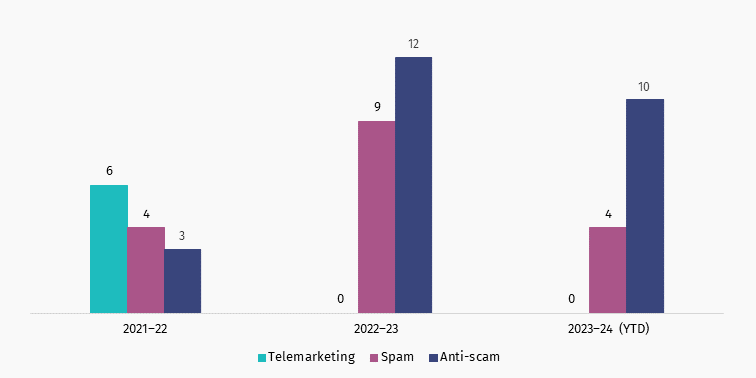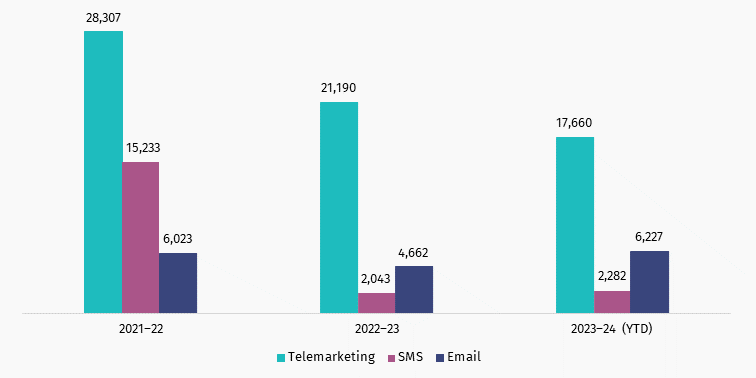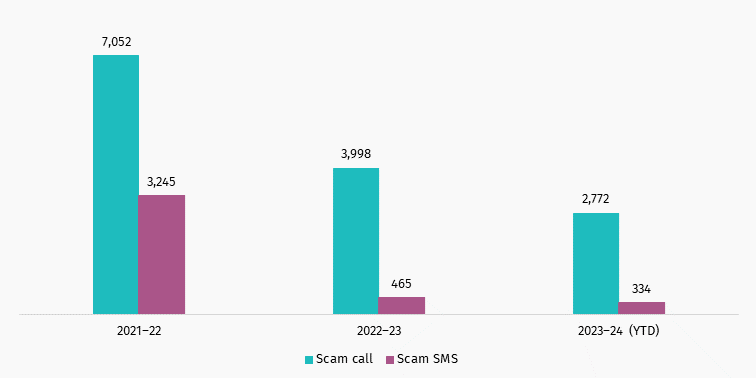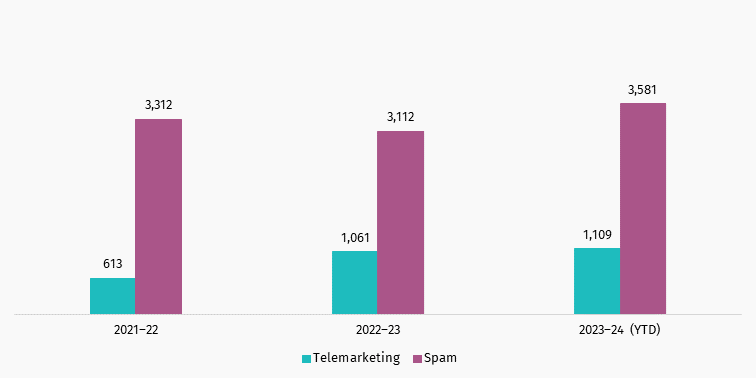Our key actions |
|
 |
Penalised Pizza Hut Australia $2.5 million for spamming consumers without consent. |
 |
Penalised sunglasses brand Luxottica $1.5 million for spamming consumers without consent. |
 |
Directed Symbio telcos to comply with anti-scam rules. |
 |
Sent 1,089 compliance alerts to businesses to address potential compliance issues (bringing the total to 4,690 this year). |
 |
Conducted an online phone scams consumer awareness campaign and issued alerts about ‘fake product email scams’, ‘watch out for loyalty points scams’ and end of financial year tax scams. |
Our 2023–24 priorities
During the 2023–24 financial year, we focused on 2 compliance priorities for unsolicited communications and scams:
- Combating SMS scams – we worked to prevent SMS scams from reaching Australians by:
- enforcing existing rules
- collaborating with Australian and global partners
- exploring new ways to stop scammers impersonating legitimate brands or organisations.
- Enforcing e-marketing unsubscribe rules – we concentrated on businesses that didn't action opt-out requests, particularly those that sent messages that may cause significant harm like direct marketing of gambling and alcohol, and ‘buy now, pay later’ products and services.
Combating scams
We continue to take the fight to scammers to disrupt their activities and protect Australians.
Telcos reported blocking 156.8+ million scam calls during the quarter (and 2.1 billion scam calls since December 2020). Telcos reported blocking 134.6+ million scam SMS during the quarter (and 668.3 million scam SMS since July 2022).
The ACMA and telcos use industry blocking statistics to identify specific and longer-term trends to help inform disruption activities.
We also:
- Gave Symbio Networks Pty Ltd and Symbio Wholesale Pty Limited each a Direction to Comply with the Reducing Scam Calls and Scam SMS Industry Code after we found they had not complied with information-sharing requirements that are important to scam disruption.
- Expanded the pilot phase of the Sender ID Registry by adding new alpha tags, to help prevent business message headers in SMS from being impersonated by scammers.
- Supported the work of the National Anti-Scam Centre, which was launched by the ACCC on 1 July 2023 under the government’s Fighting Scams initiative.
- Conducted an online consumer campaign to raise awareness about how to spot and stop phone scams. This included releasing translations in Arabic, Simplified Chinese, Traditional Chinese, Hazaragi, Khmer, Korean, Persian, Punjabi, Thai and Vietnamese
- Developed anti-phone scam material for First Nations Australians.
- Issued consumer alerts about fake product email scams, loyalty points scams, and end-of-financial-year scams.
- Worked alongside telcos, government agencies, international regulators and well-known brands to disrupt phone scams by providing data and intelligence.
Find out about protections from phone scams.
Enforcing unsubscribe rules
Key actions and outcomes in our focus on unsubscribe rules include:
- Luxottica Retail Australia Pty Ltd paying a $1,512,500 infringement notice and entering into a 3-year court enforceable undertaking.
- Pizza Pan Group Pty Ltd (trading as Pizza Hut) paying a $2,502,500 infringement notice and entering into 3-year court enforceable undertaking.
- Both Luxottica and Pizza Hut will also appoint an independent consultant to review their compliance with the Spam Act and make improvements.
We gave 521 compliance warnings to businesses where complaints alleged they had potential issues meeting unsubscribe requirements, and provided specific fact sheets about these obligations.
Our 2024–25 priorities
We announced our new compliance priorities for 2024–25, including:
- Targeting misleading spam messages – our priority is to enforce spam rules to stop commercial messages being misleadingly sent as ‘service’ or non-commercial messages. This especially applies to messages from businesses where there may be a high risk of harm to consumers, like interactive wagering or financial services. We will also focus on compliance in the online retail sector by educating businesses about spam rules and taking formal action where serious and systemic matters are found.
- Disrupting SMS impersonation scams – we will work to disrupt the distribution and impact of these scams by enforcing rules that telcos need to follow to identify and prevent SMS scams and sharing intelligence with fellow regulators in Australia and internationally. We will continue to develop the SMS Sender ID Register, which aims to stop Australians from receiving ‘impersonation’ scams by protecting the alphanumeric sender IDs (alpha tags) of legitimate brands, businesses, and government services from being hijacked by scammers.
Key compliance issue: ‘Misleading spam messages’
We’ve had an increase in complaints alleging a lack of understanding by some businesses about what makes an electronic message ‘commercial’ under the Spam Act. This misunderstanding most commonly arises where messages that are mostly ‘factual’ – like a bill, invoice or other account or service-related message – also include some form of promotional or sales content.
Under the spam rules, if an electronic message contains any promotional or sales content, it is considered to be commercial, regardless of whether the main content or purpose is factual.
Messages may also be commercial if promotional or sales material is directly available via links, phone numbers or contacts listed in the message.
Examples of messages likely to be commercial include:
- Service or support messages that include commercial promotions or offers of the business’s (or another business’s) products and services.
- A bill or invoice sent to a customer that has a banner advertisement for products or services, or that directly links to an ad for products or services (including promotion of an app).
- A ‘follow-up’ email to an existing customer that promotes additional products and services.
- Messages sent to comply with other laws – such as product disclosures or account confirmations – if they also contain any additional promotional material.
Logos or branding in an otherwise factual message would not generally be considered commercial, but care should be taken with any links embedded in the logo or branding, to ensure they are not directed to promotional or sales material.
The simplest way to comply is to keep ‘service’ or factual messages separate from any messages that have, or link to promotional content.
Remember, if the message contains a link to commercial content, the entire message is considered commercial.
For commercial messages to be sent, businesses must have consent. Commercial messages must also include accurate information about the sender and a functional unsubscribe.
Businesses are encouraged to familiarise themselves with these rules and ensure their service or factual messages are compliant.
Learn more about the spam rules.
Investigations and enforcement
At the end of this quarter, we had:
- 1 anti-scam investigation in progress
- 3 spam investigations in progress
- 20 court-enforceable undertakings in force, including 3 relating to anti-scam rules.
For the 12 months to the end of the quarter, we took an average of 3.7 months to complete spam investigations and 4.8 months to complete anti-scam investigations.
View our enforcement actions for breaches of spam and telemarketing laws.
View our enforcement actions for breaches of scam laws.
Finalised investigations

Complaints
We received more than 6,400 complaints from consumers about alleged breaches of telemarketing and spam laws in this quarter:
- The retail, solar, and building and maintenance sectors were the most complained about industries (excluding scams).
- There has been a substantial decrease in complaints about the building and maintenance sector since 1 May, when a ban on cold call telemarketing about the Victorian Energy Upgrades scheme came into effect.
Complaints received by financial year

Note: We have also received 63 complaints about commercial instant messages in 2023–24.
Complaints received about scam calls and SMS

Compliance alerts
If we receive enough information, we alert businesses about potential compliance issues raised in complaints. One alert can relate to several issues or complaints.
Compliance alerts given to businesses

More information
Find out more about spam and telemarketing rules, including how to make a complaint.
Subscribe to our newsletters to get updates about our actions on telemarketing, spam, and scams.
